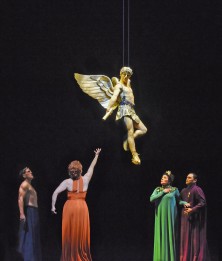 The Dallas Opera boldly opens its 2015-16 season with a triumphant world premiere of Jake Heggie’s Great Scott with an inventive, original libretto by Tony-award winning playwright (and Texas native) Terence McNally. Infused with humor and sensitivity, it tells the story of Arden Scott (stunningly portrayed by Joyce DiDonato), found the lost opera’s score), a successful international opera singer who returns to her hometown to play the lead in the American Opera’s world premiere of Rosa Dolorosa, Figlia di Pompei, a long-lost 19th-century bel canto opera by Vittorio Bazzetti that Arden discovered in St. Petersburg. She offered it to her childhood mentor Winnie Flato (played solidly by legendary mezzo Frederica von Stade), the artistic director of American Opera, in hopes of boosting the flagging opera company’s finances. As luck with have it, the hometown team is in the Super Bowl, and the big game is the same night as the opera’s premiere.
The Dallas Opera boldly opens its 2015-16 season with a triumphant world premiere of Jake Heggie’s Great Scott with an inventive, original libretto by Tony-award winning playwright (and Texas native) Terence McNally. Infused with humor and sensitivity, it tells the story of Arden Scott (stunningly portrayed by Joyce DiDonato), found the lost opera’s score), a successful international opera singer who returns to her hometown to play the lead in the American Opera’s world premiere of Rosa Dolorosa, Figlia di Pompei, a long-lost 19th-century bel canto opera by Vittorio Bazzetti that Arden discovered in St. Petersburg. She offered it to her childhood mentor Winnie Flato (played solidly by legendary mezzo Frederica von Stade), the artistic director of American Opera, in hopes of boosting the flagging opera company’s finances. As luck with have it, the hometown team is in the Super Bowl, and the big game is the same night as the opera’s premiere.
But the football game is the least of Arden’s worries. She is at a pivotal point in her career; she has her ambitious and talented protégé Tatyana Bakst (brilliant soprano Ailyn Pérez) hot on her heels; she feels the crushing weight of Bazzetti’s expectations for Rosa; she wants her sacrifices for art to be worthwhile (“I want to matter”); and she has reunited with her old flame, Sid (suavely confident baritone Nathan Gunn), who is now a successful local architect. In short, her sanity is being tested.
The engaging first act is a behind-the-curtain look at rehearsing opera. The conductor Eric Gold (skilled bass Kevin Burdette) complains about being born in the wrong century, while the young stage manager Roane (energetic and amazing countertenor Anthony Roth Constanzo) tells him that the future is more Lady Gaga than bel canto. They share an unexpected flirtation. In fact, it is notable that the gay content is not just restricted to innuendo like in most operas, but instead, includes well-formed gay characters.
The fine chorus serves as both supporting voices and audience to the four leads in Rosa Dolorosa. Tenor Anthony Candolino (powerful singing from Rodell Rosel ) and baritone Wendell Swann (muscular performance from Michael Mayes ) jockey for dominance and favor in the eyes of Winnie Flato. The growing competition between Tatyana and Arden parallels the power struggle between the men.
Winnie and Arden share a touching duet, with Arden attributing her fame and success partly to Winnie’s nurturing tutelage. The emotional crux of Act I resides in the surprise meeting of Arden and Sid. Sid’s son Tommy has a small but important role in Rosa Dolorosa. Arden and Sid flirt and sing about the past, their respective divorces, and eventually agree to go on a date.
The second act opens with a beautiful but unrecognizable rendition of the Star-Spangled Banner at the Super Bowl by Tatyana, which Arden turned down to focus on the opera. It’s the night of the performance, and the first act of Rosa Dolorosa goes down well, but it’s in Act 2 that the production team really shines.
Led by veteran stage director Jack O’Brien, the stage is transformed beautifully. Set designer Bob Crowley does a magnificent job, taking the audience backstage and then in front of the stage as needed to advance the narrative. Wigs and make-up by David Zimmerman are great. But the costumes, also by Crowley, fall flat for the cast for Rosa Dolorosa. During the ghost scene with Bazzetti, lighting designer Brian MacDevitt particularly excels. Still, this scene drags a bit. Projection designer Elaine J. McCarthy‘s work adds much to the production. (Her talent is frequently showcased at DO, and for good reason. The projections of lava make the volcano scene much more dynamic.)
Two musical highlights in Act 2 include the aria by Roane which is an ode to the many “invisible people” who make great art happen. The other is the exquisite quartet from Winnie, Arden, Tatyana, and Roane towards the end. They each sing about the situation they find themselves in, and how they may proceed. This kind of storytelling device is more typically found towards the exposition of operas, so it was a welcome twist.
The orchestra is conducted by Patrick Summers of the Houston Grand Opera, the preferred conductor of Heggie (Summers also conducted the premieres of Dead Man Walking, Three Decembers and Moby-Dick). The music is lyrical and accessible throughout, and even a whistle can be heard in one overture. Overall they were solid, but the orchestra did sound unbalanced at times in Act 2.
Go catch one of the remaining performances of this new American opera. Heggie has created a work that Dallas, and indeed all Americans, can be proud of.
— Alicia Chang















